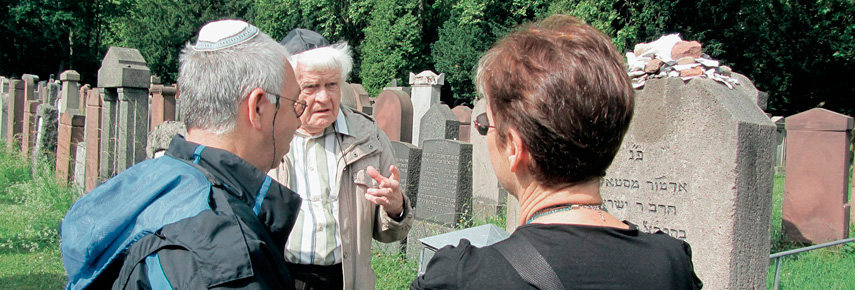The Morgensterns
*Participants of the visiting programme of the City of Frankfurt in 2016 –
First, second and third generation:*
Sonja Morgenstern-Marchesano, widow of Max Unger, widow of Armand Marchesano,
her son Jeff Unger and his wife Alisa Unger,
Karen Pomerance, daughter of Zelma Brown, Sonja’s sister,
Sasha Pomerance, Karen’s daughter,
Yael Greenspan and Tiferet Lehrman, granddaughters of Sonja’s sister Gala (Egele) Greenspan
The Morgenstern parents
Leib/ Leo Morgenstern,
born on February 27th , 1901 in Zrencin/ Krosno, Poland
businessman
emigrated 1939 with his wife and his three daughters
from Frankfurt to London/ UK;
returned to Frankfurt in 1950,
died in Frankfurt on February 22nd , 1954
is buried in Frankfurt
Fajge Lea Morgenstern, née Minc,
born on June 15th ,1906 in Krasnik/ Poland
emigrated to London/ UK in 1939
died on November 29th , 1943 in Twyford/UK
Daughters of Fajge and Leo
Sonja Marchesano, née Morgenstern
widow of Max Unger and Armand Marchesano,
born on March 31st ,1932 in Frankfurt,
seamstress and clerk
widow of Max Unger, born June 27th ,1928 in Oldenburg
died in June 1963 / USA
widow of Armand Marchesano, born July 7th ,1927
died on February 29th ,2016/ USA
businessman and musician (Orlando Society Orchestra)
Sonja lives in Orlando/ Florida, USA
Zelma/ Selma Brown, née Morgenstern
born on February 7th,1935 in Frankfurt
died on July 6th ,1995/ UK
Egele/ Gala Greenspan, née Morgenstern
born on November 4th ,1938 in Frankfurt
Gala lives in Jerusalem/ Israel
Sons of Sonja Marchesano, née Morgenstern
Larry Unger, born on December 17th , 1957/ USA
Jeffrey/ Jeff Unger, born on November 4th ,1961
married to Alisa Unger, born on November 28th, 1961
the couple lives in Atlanta/Georgia, USA
Jeff and Alisa have one daughter, Brandi Maxine, born on June 22nd, 1988 and
one son, Jason Scott, born on October 31st, 1991
Daughter of Zelma Brown, née Morgenstern
Karen Pomerance, née Brown
born on July 21st ,1962
businesswoman
lives in London/UK
two sons: Joshua, born on February 16th, 1990 with his wife Michelle and
daughter Amelie, born on January 20th, 2015 (making Aliyah in 2016) and
Nathan, born on July 22nd, 1993 (London/UK)
and one daughter: Sasha
Granddaughter of Zelma Brown, née Morgenstern
Sasha Pomerance, born on July 13th , 1987 in London/UK
emigration to Israel (Aliyah)
event-manager
lives in Tel Aviv/ Israel
Granddaughters of Gala Greenspan, née Morgenstern
Yael Greenspan, born on May 30th ,1994 in Jerusalem/ Israel
is studying interior design in Israel
Tiferet Lehrman, born in 1995 in Jerusalem/Israel
make-up artist (especially for brides)
lives in Jerusalem (like Yael)
Brothers of Leo Morgenstern
Chaskel Morgenstern
born on February 15th ,1904 in Zrencin/ Poland
in Frankfurt since 1927
died onApril 2nd ,1976 in New York/ USA
deportation to Poland in 1938
returned to Frankfurt after World War II
later emigration to the USA
businessman
his first wife, Blanka, née Merenländer
was deported and murdered
in 1949 second marriage to Irene, née Margulies in Frankfurt
born on March 31st ,1918 in Janow/Poland
three sons: Leo, Steven and Seymour
Izzy Morgenstern
businessman
emigrated to the USA, followed by family
Brother of Fajge Morgenstern, née Minc
Leo Minc,
emigrated with his family to the UK in 1933
bespoke tailor and entrepreneur
Grandmothers
Ester Malka Minc (Fajge’s mother)
deportation to Poland in 1938,
emigrated later to the UK
Sara Steinberger, (Leo’s mother)
died before World War II; is buried in Frankfurt
Grandfathers (Leo’s and Fajge’s fathers)
both killed in pogroms in Poland
before their families flee to Germany

